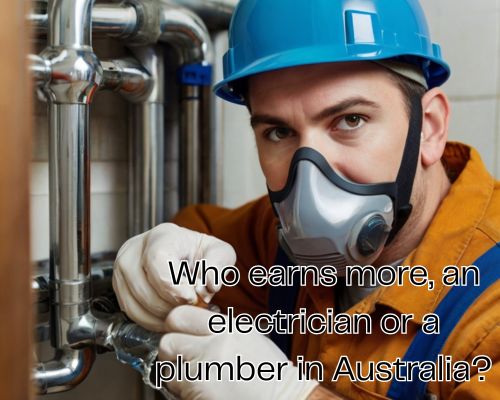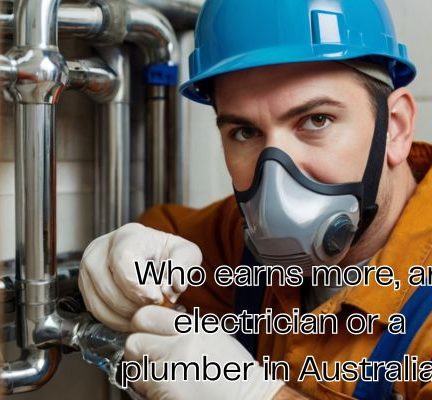In Australia’s dynamic trade workforce, a common question arises: Who earns more, an electrician or a plumber? In Victoria—one of the nation’s construction hotspots—the answer isn’t as simple as quoting a single hourly rate. Instead, it requires a nuanced look at qualification levels, union agreements, geographical differences, and ongoing demand in the skilled trades market.

For young Australians considering a trade, or experienced workers debating a career shift, comparing plumber and electrician earnings in Victoria helps make an informed choice. With Plumber Warragul, let’s break it down with real-world insight.
The Current State of the Trades in Victoria
Victoria, particularly in major urban hubs like Melbourne, Geelong, and Ballarat, is undergoing continued infrastructure expansion. From high-rise apartment buildings to suburban developments, the state remains a magnet for skilled tradespeople. The Victorian Building Authority (VBA) has reported consistent growth in new building approvals, fueling demand for both electricians and plumbers.
Both professions are classed as licensed trades in Australia, requiring formal training, certifications, and often apprenticeships under a licensed practitioner. This also means both trades benefit from government recognition and strong earning potential, but which one actually comes out on top?
Average Salaries: Plumber vs. Electrician in Victoria
Let’s look at some numbers. According to data from Fair Work Australia, Seek, and JobOutlook, here’s how earnings stack up in Victoria:
| Role | Average Annual Salary (Victoria) | Average Hourly Rate |
|---|---|---|
| Electrician | $85,000 – $120,000 | $40 – $55/hour |
| Plumber | $80,000 – $115,000 | $38 – $52/hour |
While both trades hover within a similar pay range, electricians often earn slightly more on average—especially those with specialist skills such as industrial electrical work, automation systems, or solar energy certifications.
Electricians working in commercial construction or for mining/industrial operations often command higher pay than residential service electricians. Likewise, plumbers specializing in gas fitting, backflow prevention, or hydraulic systems also edge toward the top end of their pay bracket.
Apprenticeship Differences and Career Progression
Training Pathways:
Both electricians and plumbers typically begin their journey via a Certificate III (Electricians through UEE30820, Plumbers via CPC32420) followed by apprenticeships. These apprenticeships last between 3–4 years, depending on the training structure and employer.
Apprenticeship wages start low—around $18–$22/hour—but increase each year.
Career Growth:
For electricians, the post-apprenticeship path might include moving into roles like:
- Industrial Maintenance Electrician
- Electrical Estimator or Project Manager
- Renewable Energy Installer (solar, battery storage)
- Electrical Contractor (self-employed, licensed)
Plumbers may progress into:
- Gas Fitting Specialist
- Roofing or Drainage Technician
- Hydraulic Services Designer
- Licensed Plumbing Contractor (also self-employed)
The entrepreneurial route can dramatically impact earning potential. In Victoria, self-employed licensed electricians often report incomes exceeding $140,000 annually, especially if operating in fast-growing areas like the Melbourne suburbs or Mornington Peninsula. The same applies to plumbers running their own service businesses in regional growth corridors like Bendigo or Shepparton. Visit Plumber Warragul for more.
Market Demand and Job Security
One of the reasons trade careers remain popular in Victoria is job security. The state continues to grapple with a shortage of qualified tradespeople, especially in regional zones.
The National Skills Commission has flagged both electricians and plumbers as priority occupations, meaning consistent job openings and potential government incentives.
However, electricians tend to benefit more from cross-industry demand, particularly in renewable energy (solar panel installation, EV charger deployment), data systems, and smart home integration. These emerging sectors enhance job prospects and push pay upward.
On the other hand, plumbers remain indispensable for housing developments, emergency repairs, water efficiency upgrades, and commercial fit-outs.
In short: Electricians may have broader long-term market opportunities, but plumbers enjoy steady demand and quicker call-outs due to the nature of their work (blocked drains, hot water issues, etc.).
Union Influence and Overtime
In Victoria, union agreements often set standardized pay rates. Electricians under ETU (Electrical Trades Union) awards might earn more than their plumbing counterparts due to:
- Higher allowances for night work
- Greater overtime compensation
- Specific allowances for high-voltage or hazardous work
That said, Master Plumbers Australia and Plumbing Trades Employees Union negotiate competitive rates for licensed plumbers, especially on commercial projects.
Overtime, weekend rates, and emergency call-outs can dramatically boost income for both trades. On-call plumbers in Melbourne CBD can earn well over $90/hour during peak periods or after hours.
What About Regional Victoria?
In areas like Mildura, Warrnambool, or Latrobe Valley, salary averages may dip slightly due to cost of living and lower construction density. However, this is offset by less competition, government housing projects, and council-backed infrastructure upgrades which fuel steady work.
Electricians in regional areas often earn around $75,000–$95,000, while plumbers might earn $70,000–$90,000, depending on job type and experience.
Moreover, tradespeople who are willing to travel or take on FIFO (Fly-In-Fly-Out) roles from Victoria to other states or remote projects can earn well above six figures—especially electricians working in mining or energy.
Final Verdict: Who Earns More?
If we’re looking purely at average income, electricians in Victoria have a slight earning edge over plumbers. The margin is typically $3,000–$7,000 per year, depending on specialization, region, and union coverage.
However, the real answer depends on variables such as:
- Specialization and niche skills
- Location within Victoria
- Willingness to work overtime or on-call
- Self-employment vs. employee role
- Market trends (e.g., solar installs vs. housing developments)
From an economic resilience standpoint, electricians may benefit more from diversification into future-facing tech sectors, while plumbers enjoy more consistent day-to-day work across residential and commercial sectors.
Key Takeaways
- In Victoria, electricians tend to earn slightly more on average than plumbers, but the gap is narrow.
- Both trades offer strong income potential, job security, and career growth, particularly for licensed professionals.
- Union awards, specialty licenses, and willingness to work overtime significantly affect take-home pay.
- Electricians may benefit more from Victoria’s push toward electrification, while plumbers remain essential across all construction projects.
So, who earns more—an electrician or a plumber in Australia? In Victoria, it’s a close race. But if you’re strategic about your certifications, work type, and entrepreneurial ventures, either trade can lead to a highly rewarding career.
